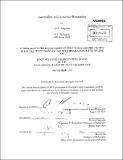| dc.contributor.advisor | Robert Stalnaker. | en_US |
| dc.contributor.author | Krupnick, Ari L. (Ari Lowell) | en_US |
| dc.contributor.other | Massachusetts Institute of Technology. Dept. of Linguistics and Philosophy. | en_US |
| dc.date.accessioned | 2011-04-25T15:54:42Z | |
| dc.date.available | 2011-04-25T15:54:42Z | |
| dc.date.copyright | 2010 | en_US |
| dc.date.issued | 2010 | en_US |
| dc.identifier.uri | http://hdl.handle.net/1721.1/62412 | |
| dc.description | Thesis (Ph. D.)--Massachusetts Institute of Technology, Dept. of Linguistics and Philosophy, 2010. | en_US |
| dc.description | Cataloged from PDF version of thesis. | en_US |
| dc.description | Includes bibliographical references (p. 81-84). | en_US |
| dc.description.abstract | In this thesis, I try to answer some basic questions about the a priori. Namely, what is it supposed to be? Should we believe in its existence? And is it important? Chapter One, "The Problem of Forgotten Evidence," sets the stage. I introduce the distinction between internalism and externalism, which plays a crucial role throughout the thesis. Roughly speaking, internalists think that one is justified in holding a given belief only if one can access adequate evidence for it, upon reflection, while externalists deny this. I argue that only an externalist can explain why we are now justified in believing things, such as facts about world history, which we originally learned on the basis of reasons we have since forgotten. Chapter Two, "Two Notions of A Priori Justified Belief," distinguishes between two ways of understanding what a priori justified beliefs are supposed to be, an internalist way and an externalist way. I argue that the two ways of understanding what a priori justified beliefs are lead to different and somewhat surprising outcomes regarding how much is a priori. When thought of in the internalist way, a priori justified beliefs are unstable and especially hard to come by in the first place. When thought of in the externalist way, however, they are secure and easier to acquire. Chapter Three, "The Importance of the A Priori," argues that there is no reason to think that the a priori is important in the strong sense which some philosophers seem to think it is. They argue for their view on the grounds that our ability to learn about the world depends on our being a priori warranted in relying on certain belief forming procedures, like taking our perceptual experiences at face value, and accepting the testimony of other people. I show that there is a sense in which that is true, but that, in that sense, it does not support the strong conclusion they ultimately want. One would mistakenly think that it does only if one illicitly switched back and forth between internalist and externalist perspectives. | en_US |
| dc.description.statementofresponsibility | by Ari L. Krupnick. | en_US |
| dc.format.extent | 84 p. | en_US |
| dc.language.iso | eng | en_US |
| dc.publisher | Massachusetts Institute of Technology | en_US |
| dc.rights | M.I.T. theses are protected by
copyright. They may be viewed from this source for any purpose, but
reproduction or distribution in any format is prohibited without written
permission. See provided URL for inquiries about permission. | en_US |
| dc.rights.uri | http://dspace.mit.edu/handle/1721.1/7582 | en_US |
| dc.subject | Linguistics and Philosophy. | en_US |
| dc.title | Internalism and armchair reasoning | en_US |
| dc.type | Thesis | en_US |
| dc.description.degree | Ph.D. | en_US |
| dc.contributor.department | Massachusetts Institute of Technology. Department of Linguistics and Philosophy | |
| dc.identifier.oclc | 710982838 | en_US |

